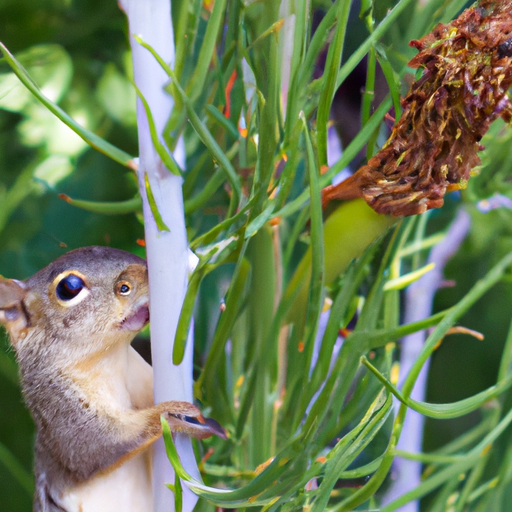In the fascinating world of nature, the question arises: do squirrels have a taste for mice? It may seem like an odd pairing, but curiosity has led us to delve into this peculiar relationship. As we explore this intriguing topic, we uncover the surprising truth behind the dining habits of these furry creatures. From their natural instincts to their diet preferences, we unravel the mystery of whether squirrels truly indulge in a mouse feast.
Table of Contents
Do Squirrels Eat Mice?
Overview of Squirrels
Squirrels are small to medium-sized rodents that belong to the family Sciuridae. They are known for their bushy tails, which they use for balance and communication. Squirrels are predominantly herbivorous, with their diet consisting mainly of nuts, seeds, fruits, and vegetables. They are agile and acrobatic, easily climbing trees and leaping from branch to branch. Squirrels are commonly found in forests, parks, and urban areas, where they build nests called dreys to live and raise their young.
Overview of Mice
Mice, on the other hand, are also small rodents that belong to the family Muridae. They have a compact body and a long, hairless tail. Mice are known for their ability to reproduce rapidly, making them a common pest in residential and agricultural areas. They are omnivorous, feeding on a variety of foods such as grains, seeds, fruits, and insects. Mice are excellent climbers and can squeeze through small openings to access food and shelter.
Diet and Feeding Habits of Squirrels
Squirrels primarily consume plant-based foods. They have a preference for nuts, especially acorns and walnuts, which they collect and store for the winter months. Squirrels also feed on seeds, berries, fruits, buds, and flowers. They have sharp teeth that enable them to crack open the shells of nuts and seeds. These resourceful creatures are known to raid bird feeders and frequently visit gardens in search of food.
Diet and Feeding Habits of Mice
Mice are omnivorous and have a less selective diet compared to squirrels. They primarily feed on grains, seeds, nuts, and fruits. However, they are also opportunistic eaters and will consume insects, small invertebrates, and even small vertebrates if the opportunity arises. Mice have a high metabolic rate and need to eat frequently to meet their energy requirements. They are known to have a search image for finding food, making it easier for them to locate and consume available resources.
Possible Interactions between Squirrels and Mice
Given their overlapping habitats and dietary preferences, squirrels and mice often encounter each other. While they generally coexist without any significant interactions, competition for resources can occasionally arise. Both species rely on similar food sources, such as seeds and nuts, which may lead to competition for these limited resources. Additionally, squirrels may inadvertently consume food that mice have already accessed or contaminated, creating indirect interactions between the two.
Predator-Prey Relationship between Squirrels and Mice
Squirrels are not natural predators of mice. They are not known to actively hunt or prey upon mice as part of their natural feeding behavior. Squirrels are herbivorous creatures that have adaptations for a plant-based diet, such as specialized teeth and digestive systems. While squirrels may occasionally consume small insects or invertebrates, predation on mice is not a typical behavior observed in squirrels.
Occasional Consumption of Mice by Squirrels
Although not their primary food source, there have been reports of squirrels occasionally consuming mice. These instances are relatively rare and may occur under specific circumstances. In times of scarcity or when their usual food sources are limited, squirrels may resort to opportunistic feeding, including consuming small vertebrates like mice. However, it is important to note that this behavior is not common and should not be considered a regular occurrence.
Reasons for Squirrels Eating Mice
The occasional consumption of mice by squirrels can be attributed to several factors. When faced with a shortage of food, squirrels may broaden their diet to include alternate food sources. This adaptive behavior allows squirrels to survive during periods of food scarcity. Additionally, squirrels are known to be curious animals, and they may investigate and taste different objects, including mice, out of curiosity rather than nutritional need.
Evidence of Squirrels Eating Mice
While there have been anecdotal reports of squirrels eating mice, scientific evidence is limited. Observing this behavior can be challenging, as it occurs infrequently and in specific circumstances. Predatory behavior in squirrels is not a well-documented phenomenon, and studies focusing specifically on squirrel-mouse interactions are scarce. More research is needed to fully understand the extent and frequency of squirrels consuming mice.
Potential Implications of Squirrels Eating Mice
The occasional consumption of mice by squirrels is unlikely to have significant ecological implications. Mice are abundant and reproduce rapidly, so occasional predation by squirrels is unlikely to affect mouse populations on a large scale. Additionally, while mice may carry disease-causing pathogens, the risk of transmission from squirrels to humans is minimal due to the infrequent and incidental nature of such interactions. Therefore, from a public health perspective, the occasional consumption of mice by squirrels is not a cause for major concern.
In conclusion, while squirrels are primarily herbivorous animals, there have been reports of them occasionally consuming mice. This behavior is not common and occurs under specific circumstances, such as scarcity of their usual food sources. The occasional consumption of mice by squirrels is unlikely to have significant ecological or public health implications. Further research is needed to better understand the factors influencing this behavior and its frequency in squirrels.

